|
[Majorityrights News] Alex Navalny, born 4th June, 1976; died at Yamalo-Nenets penitentiary 16th February, 2024 Posted by Guessedworker on Friday, 16 February 2024 23:43. [Majorityrights News] A Polish analysis of Moscow’s real geopolitical interests and intent Posted by Guessedworker on Tuesday, 06 February 2024 16:36. [Majorityrights News] Another dramatic degradation of Russia’s combat capacity Posted by Guessedworker on Wednesday, 23 April 2025 08:49. [Majorityrights Central] A British woman in Ukraine and an observer of Putin’s war Posted by Guessedworker on Monday, 14 April 2025 00:04. [Majorityrights News] France24 puts an end to Moscow’s lie about the attack on Kryvyi Riy Posted by Guessedworker on Monday, 07 April 2025 17:02. [Majorityrights News] If this is an inflection point Posted by Guessedworker on Thursday, 03 April 2025 05:10. [Majorityrights News] Sikorski on point Posted by Guessedworker on Friday, 28 March 2025 18:08. [Majorityrights Central] Piece by peace Posted by Guessedworker on Wednesday, 19 March 2025 08:46. [Majorityrights News] Shame in the Oval Office Posted by Guessedworker on Saturday, 01 March 2025 00:23. [Majorityrights News] A father and a just cause Posted by Guessedworker on Tuesday, 25 February 2025 23:21. [Majorityrights Central] Into the authoritarian future Posted by Guessedworker on Friday, 21 February 2025 12:51. [Majorityrights Central] On an image now lost: Part 2 Posted by Guessedworker on Saturday, 15 February 2025 14:21. [Majorityrights News] Richard Williamson, 8th March 1940 - 29th January 2025 Posted by Guessedworker on Monday, 03 February 2025 10:30. [Majorityrights Central] Freedom’s actualisation and a debased coin: Part 2 Posted by Guessedworker on Saturday, 11 January 2025 01:08. [Majorityrights News] KP interview with James Gilmore, former diplomat and insider from first Trump administration Posted by Guessedworker on Sunday, 05 January 2025 00:35. [Majorityrights Central] Aletheia shakes free her golden locks at The Telegraph Posted by Guessedworker on Saturday, 04 January 2025 23:06. [Majorityrights News] Former Putin economic advisor on Putin’s global strategy Posted by Guessedworker on Monday, 30 December 2024 15:40. [Majorityrights News] Trump will ‘arm Ukraine to the teeth’ if Putin won’t negotiate ceasefire Posted by Guessedworker on Tuesday, 12 November 2024 16:20. [Majorityrights News] Olukemi Olufunto Adegoke Badenoch wins Tory leadership election Posted by Guessedworker on Saturday, 02 November 2024 22:56. [Majorityrights News] What can the Ukrainian ammo storage hits achieve? Posted by Guessedworker on Saturday, 21 September 2024 22:55. [Majorityrights Central] An Ancient Race In The Myths Of Time Posted by James Bowery on Wednesday, 21 August 2024 15:26. [Majorityrights Central] Slaying The Dragon Posted by James Bowery on Monday, 05 August 2024 15:32. [Majorityrights Central] The legacy of Southport Posted by Guessedworker on Friday, 02 August 2024 07:34. [Majorityrights News] Farage only goes down on one knee. Posted by Guessedworker on Saturday, 29 June 2024 06:55. [Majorityrights News] An educated Russian man in the street says his piece Posted by Guessedworker on Wednesday, 19 June 2024 17:27. [Majorityrights Central] Freedom’s actualisation and a debased coin: Part 1 Posted by Guessedworker on Friday, 07 June 2024 10:53. [Majorityrights News] Computer say no Posted by Guessedworker on Thursday, 09 May 2024 15:17. [Majorityrights News] Be it enacted by the people of the state of Oklahoma Posted by Guessedworker on Saturday, 27 April 2024 09:35. [Majorityrights Central] Ukraine, Israel, Taiwan … defend or desert Posted by Guessedworker on Sunday, 14 April 2024 10:34. [Majorityrights News] Moscow’s Bataclan Posted by Guessedworker on Friday, 22 March 2024 22:22. [Majorityrights News] Soren Renner Is Dead Posted by James Bowery on Thursday, 21 March 2024 13:50. [Majorityrights News] Collett sets the record straight Posted by Guessedworker on Thursday, 14 March 2024 17:41. [Majorityrights Central] Patriotic Alternative given the black spot Posted by Guessedworker on Thursday, 14 March 2024 17:14. [Majorityrights Central] On Spengler and the inevitable Posted by Guessedworker on Wednesday, 21 February 2024 17:33. [Majorityrights News] Alex Navalny, born 4th June, 1976; died at Yamalo-Nenets penitentiary 16th February, 2024 Posted by Guessedworker on Friday, 16 February 2024 23:43. [Majorityrights News] A Polish analysis of Moscow’s real geopolitical interests and intent Posted by Guessedworker on Tuesday, 06 February 2024 16:36. [Majorityrights News] Another dramatic degradation of Russia’s combat capacity Posted by Guessedworker on Wednesday, 23 April 2025 08:49. [Majorityrights Central] A British woman in Ukraine and an observer of Putin’s war Posted by Guessedworker on Monday, 14 April 2025 00:04. Majorityrights News > Category: Separatist AllianceGenerally speaking, I don’t like to go into World War II, because I view it as a nasty history for Europeans, about which few people alive had anything to do - therefore, I prefer to uncouple the ethnonationalist cause from it - and especially from Nazism - for the sake of Germans perhaps especially. However, because a needless and counterproductive tendency to try to fully exonerate and redeem Hitler and the Nazis persists - e.g., Mark Collette and “ComfyTangent” recommending that people attend to the schlock revisionism of “The Greatest Story Never Told”; David Duke persisting in blaming anyone but Hitler for WWII - there is yet need to address the issue enough to put it to rest for anyone reasonable - not something to expect from the Stormfront crowd, e.g; and many have not yet gotten Dr. Lindtner’s message regarding the disingenuousness of Faurisson and other revisionists. We will be engaging podcasts on the matter with a Swedish colleague, et al. in days to come to straighten-out the record on WWII - why White Nationalism need not and should no be burdened with Hitler/Nazi association, denial, let alone its idealization and idolatry. In the meantime, while you will hear a great deal from American White Nationalists about the terrible fire-bombing of Dresden, you can expect them to remain irresponsibly silent (or make revolting excuses) regarding events like the quelling of the 1944 Warsaw Uprising. If anyone has better information to add, they are welcome, but again, because I don’t like going into WWII history, at this point I’ll merely set forth a textual sketch of the event from Wikipedia and this video:
Polish resistance: Berlin 1st Army: 5,660 casualties[7] 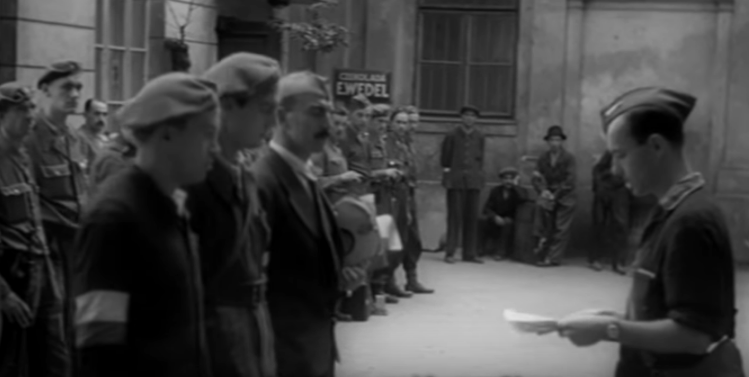 Poland 1944–45: The Warsaw Uprising (Polish: powstanie warszawskie; German: Warschauer Aufstand) was a major World War II operation, in the summer of 1944, by the Polish underground resistance, led by the Home Army (Polish: Armia Krajowa), to liberate Warsaw from German occupation. The uprising was timed to coincide with the retreat of the German forces from Poland ahead of the Soviet advance.[9] While approaching the eastern suburbs of the city, the Red Army temporarily halted combat operations, enabling the Germans to regroup and defeat the Polish resistance and to raze the city in reprisal. The Uprising was fought for 63 days with little outside support. It was the single largest military effort taken by any European resistance movement during World War II.[10] 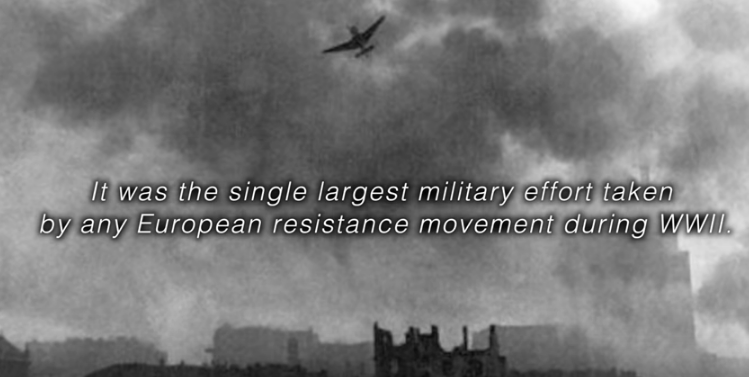 The Uprising began on 1 August 1944 as part of a nationwide Operation Tempest, launched at the time of the Soviet Lublin–Brest Offensive. The main Polish objectives were to drive the Germans out of Warsaw while helping the Allies defeat Germany. An additional, political goal of the Polish Underground State was to liberate Poland’s capital and assert Polish sovereignty before the Soviet-backed Polish Committee of National Liberation could assume control. Other immediate causes included a threat of mass German round-ups of able-bodied Poles for “evacuation”; calls by Radio Moscow’s Polish Service for uprising; and an emotional Polish desire for justice and revenge against the enemy after five years of German occupation.[11][12] 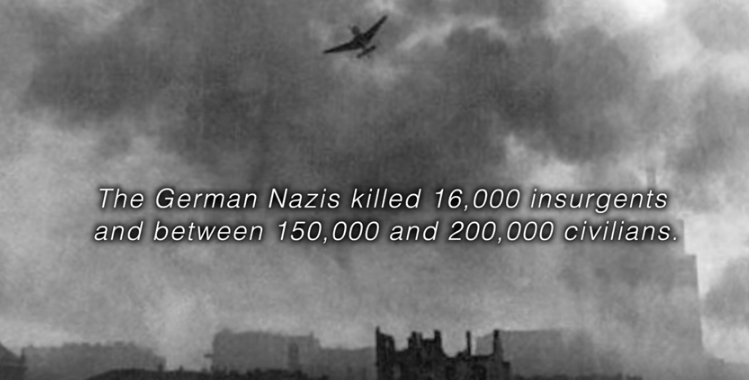 Initially, the Poles established control over most of central Warsaw, but the Soviets ignored Polish attempts to maintain radio contact with them and did not advance beyond the city limits. Intense street fighting between the Germans and Poles continued. By 14 September, the eastern bank of the Vistula River opposite the Polish resistance positions was taken over by the Polish troops fighting under the Soviet command; 1,200 men made it across the river, but they were not reinforced by the Red Army. This, and the lack of air support from the Soviet base five-minute flying time away, led to allegations that Stalin tactically halted his forces to let the operation fail and the Polish resistance to be crushed. Arthur Koestler said the Soviet disposition will rank on an ethical level with Lidice.”[13] 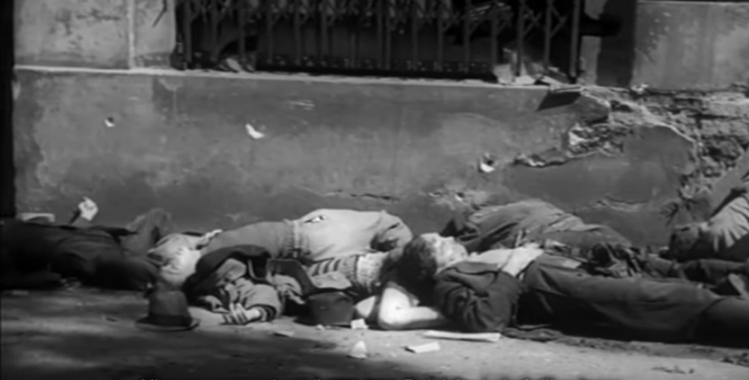 Winston Churchill pleaded with Stalin and Franklin D. Roosevelt to help Britain’s Polish allies, to no avail.[14] Then, without Soviet air clearance, Churchill sent over 200 low-level supply drops by the Royal Air Force, the South African Air Force, and the Polish Air Force under British High Command, in an operation known as the Warsaw Airlift. Later, after gaining Soviet air clearance, the U.S. Army Air Force sent one high-level mass airdrop as part of Operation Frantic. Although the exact number of casualties remains unknown, it is estimated that about 16,000 members of the Polish resistance were killed and about 6,000 badly wounded. In addition, between 150,000 and 200,000 Polish civilians died, mostly from mass executions. Jews being harboured by Poles were exposed by German house-to-house clearances and mass evictions of entire neighbourhoods. German casualties totalled over 8,000 soldiers killed and missing, and 9,000 wounded. During the urban combat approximately 25% of Warsaw’s buildings were destroyed. Following the surrender of Polish forces, German troops systematically levelled another 35% of the city block by block. Together with earlier damage suffered in the 1939 invasion of Poland and the Warsaw Ghetto Uprising in 1943, over 85% of the city was destroyed by January 1945, when the course of the events in the Eastern Front forced the Germans to abandon the city.
German women killed so far in 2018 by migrants: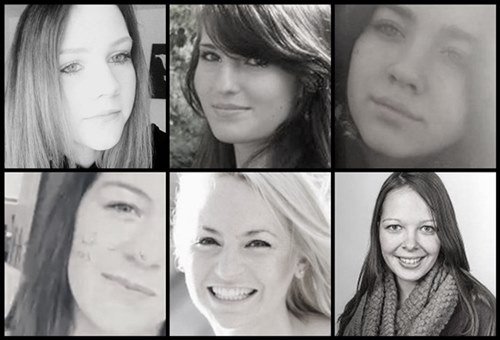 Anna L. Theis (16) Johanna Hahn (22) Keira Gross (14) Mireille B. (17) Melanie Rehberger (30) Sophia Lösche (28) Cora B. (18) Susanne Thierolf (40) Sandra P. (34) Susanna F. (14) Amanda Drini (24)
“Hispanics bigger problem, blacks used to be OK when headed by strong black fathers” - says Dr. Dupe
In fact, when choosing sides in a friend enemy distinction between so called “Hispanics” and blacks, i.e., regarding whom to form coalitions with, there is no question; and if the Hispanics are truly wise, they will side in coalition with White groups and Asians against blacks, YKW and Muslims. It won’t be easy to form this coalition, perhaps some form of coordination will have to suffice for now ..the negotiation of coalition with White Hispanics should be easier, of course, except for our dumb White right wing American element, which virtually sees people who don’t have blue eyes and blonde hair as non-White, but White Left Ethnonationalism should reach out to build coalitions with “la Raza”, or some facsimile thereof, not only the ones who are primarily White, but also the ones who are part White and part Indian and ones that are primarily Amerindian. We have to convince them that the issue of “Hispanics” and Whites is one of negotiation and coordination - critically, of carrying capacity of the nations and resources; and in defense against YKW and Islam and blacks - The later group of which they are notoriously good at defending themselves against in a perennial fight of theirs; against blacks who would stay on their turf. That defense can help us sort out, and with coordination, achieve separatism from blacks and those “Hispanics” who are significantly black….. Sooner or later “Hispanics”, not being so flighty and disposed to take recourse in nerd-dome and “intellectual rationalizations” as Whites do, realize that it is absolutely necessary to fight for their women, their people and turf against blacks, to discriminate against them. And they are correct about that. The problem is not that “blacks used to be ok when they were not misled by Jewry” as Dr. Dupe alleges. This their nature, this is reality. So, when it comes to that fight, we should say, ‘go La Raza Unita!’ or whatever potentially White allied “Hispanic” group is defending their women and themselves against blacks. Furthermore, they won’t be shedding too many tears about historical Jewish victimhood, nor see much common ground with Israel. La Raza was founded in wise skepticism of Jewry.
Page 15 of 19 | First Page | Previous Page | [ 13 ] [ 14 ] [ 15 ] [ 16 ] [ 17 ] | Next Page | Last Page |
|

Existential IssuesDNA NationsCategoriesContributorsLinksMR Central & NewsCommentsThorn commented in entry 'Piece by peace' on Mon, 24 Mar 2025 18:38. (View) Guessedworker commented in entry 'Piece by peace' on Mon, 24 Mar 2025 16:47. (View) Thorn commented in entry 'Piece by peace' on Mon, 24 Mar 2025 16:44. (View) Thorn commented in entry 'Piece by peace' on Mon, 24 Mar 2025 12:23. (View) Guessedworker commented in entry 'Piece by peace' on Mon, 24 Mar 2025 12:02. (View) Thorn commented in entry 'Piece by peace' on Mon, 24 Mar 2025 11:58. (View) Guessedworker commented in entry 'Piece by peace' on Mon, 24 Mar 2025 00:24. (View) Thorn commented in entry 'Piece by peace' on Sun, 23 Mar 2025 23:18. (View) Guessedworker commented in entry 'Piece by peace' on Sun, 23 Mar 2025 23:04. (View) Thorn commented in entry 'Piece by peace' on Sun, 23 Mar 2025 21:45. (View) Guessedworker commented in entry 'Piece by peace' on Sun, 23 Mar 2025 18:48. (View) Thorn commented in entry 'Piece by peace' on Sun, 23 Mar 2025 16:58. (View) Guessedworker commented in entry 'Piece by peace' on Sun, 23 Mar 2025 16:04. (View) Thorn commented in entry 'Piece by peace' on Sun, 23 Mar 2025 12:34. (View) Guessedworker commented in entry 'Piece by peace' on Sun, 23 Mar 2025 10:34. (View) Guessedworker commented in entry 'Piece by peace' on Sun, 23 Mar 2025 10:14. (View) Guessedworker commented in entry 'Piece by peace' on Sun, 23 Mar 2025 04:45. (View) Thorn commented in entry 'Piece by peace' on Sun, 23 Mar 2025 00:11. (View) Guessedworker commented in entry 'Piece by peace' on Sat, 22 Mar 2025 23:15. (View) Thorn commented in entry 'Piece by peace' on Fri, 21 Mar 2025 23:15. (View) Manc commented in entry 'Piece by peace' on Wed, 19 Mar 2025 14:20. (View) Thorn commented in entry 'Piece by peace' on Wed, 19 Mar 2025 14:13. (View) Guessedworker commented in entry 'Piece by peace' on Wed, 19 Mar 2025 13:54. (View) Thorn commented in entry 'A father and a just cause' on Mon, 10 Mar 2025 18:43. (View) Thorn commented in entry 'A father and a just cause' on Sun, 09 Mar 2025 14:47. (View) Manc commented in entry 'A father and a just cause' on Sun, 09 Mar 2025 13:55. (View) Thorn commented in entry 'A father and a just cause' on Sat, 08 Mar 2025 23:56. (View) Guessedworker commented in entry 'A father and a just cause' on Sat, 08 Mar 2025 22:09. (View) Thorn commented in entry 'A father and a just cause' on Sat, 08 Mar 2025 20:53. (View) Thorn commented in entry 'A father and a just cause' on Sat, 08 Mar 2025 20:37. (View) Manc commented in entry 'A father and a just cause' on Sat, 08 Mar 2025 20:22. (View) Guessedworker commented in entry 'A father and a just cause' on Sat, 08 Mar 2025 18:32. (View) Thorn commented in entry 'A father and a just cause' on Sat, 08 Mar 2025 16:07. (View) Guessedworker commented in entry 'A father and a just cause' on Sat, 08 Mar 2025 15:18. (View) Thorn commented in entry 'A father and a just cause' on Sat, 08 Mar 2025 12:15. (View)  
|